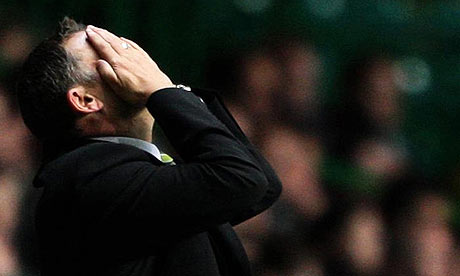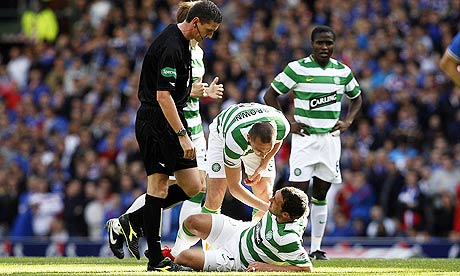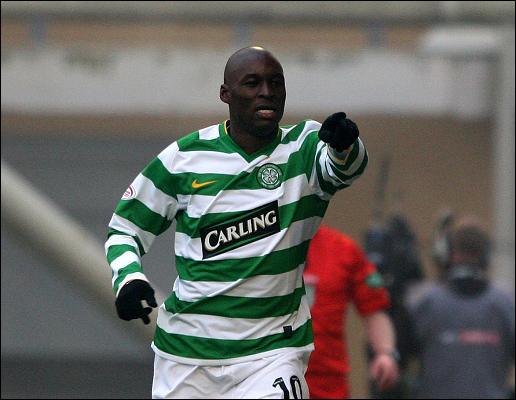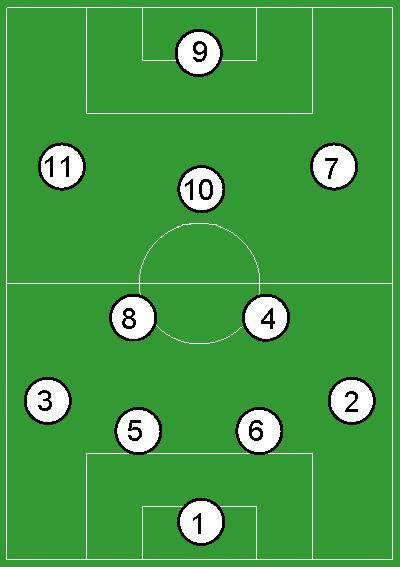My thought at the time was that I might be convinced of that if we win the next game – a home game against Hibernian. Win that game and we would be five points clear with three games to play. That would be enough to see us over the line and not undo the hard work done at Ibrox. It would also be our two toughest games of the split out of the way having played second and third in the league. Sadly, it didn’t got that way. Hibs took an early lead at Celtic Park and while Celtic managed to eventually claw the game back to 1-1, the Hibernian manager showed his tactical ability by making some astute substitutions, turning the game back in Hibs’ favour and running out 3-1 winners. Rangers soon had the gap back down to two points the following day – a gap that would allow Rangers to have a chance on that final day of the season and ultimately pip us for the title by beating the same Hibs team 1-0 – a result that was just enough to see Hibs finish third and take the European spot. More astute managerial ability… or downright disgusting if you happened to be at Fir Park looking to lash out at anyone and anything for what you’d just seen.
The Hibs manager at the time was of course Tony Mowbray, and I remember thinking after watching him out-think Martin O’Neill that day at Celtic Park that I wouldn’t mind if he was back at Celtic Park one day in the home dugout. A fact I spent a good deal of time telling people four years later when that did indeed happen.
Of course, it wasn’t going to be easy for him coming in at Celtic. Those four years in between had seen Celtic win three titles in a row under Gordon Strachan, featuring twice in the latter stages of the Champions League along the way. But Strachan had divided the support, with many feeling they had suffered a very poor product on the park for too long – something which had ultimately resulted in the inevitable return of Rangers to the SPL summit despite their financial difficulties. So Mowbray was tasked with not just getting the title back from “Skint Rangers”, but to play attractive football in doing so. No mean feat, given Strachan before him hadn’t managed it.
It started fairly well though. An entertaining pre-season, winning the Wembley Cup ahead of European Champions Barcelona due to the fact that we had beaten Spurs and they hadn’t, showed great promise. The setback of losing the opening home leg of the Champions League qualifier to Dinamo Moscow even allowed Mowbray to do something no other Celtic manager had done before – oversee a first leg home defeat turn around in Europe – which in turn set up a very tasty tie with Arsenal. Though he ultimately lost this second tie many saw it as being down to some bad luck with the draw itself, the goals conceded at Celtic Park, and the diving of a certain Arsenal forward which resulted in some awful officiating. This game would, in hindsight, be something of a microcosm of Mowbray’s problems throughout his tenure. Nevertheless, Celtic would have to make do with the newly branded Europa League – but Mowbray’s real task for the season would begin domestically.
With the transition into September came the closing of the summer transfer window… and the first mumurs of discontent from the fans. Some who had seen the folly of Strachan’s squad questioned why much of it was still together while the early promise of Donati was sold off to his homeland. Possibly most bizarre of all was the new contract for Darren O’Dea before farming him out to Reading on loan – leaving Celtic with just three first choice centre backs, none of which had exactly covered themselves in glory the previous season despite the Player of the Year awards for Gary Caldwell from all but the players themselves. At the time I suspected the players knew something about the game that the suits and pundits didn’t.
And so we reached the Europa League group stage opener – an away game in Israel against Hapoel Tel-Aviv. A game which Celtic dominated for 75 minutes but went on to lose as a 1-0 lead became a 2-1 defeat. This was followed a couple of weeks later with a 1-1 draw at home to old foes Rapid Vienna and it was rapidly becoming apparent that Caldwell’s belief that we could possibly win the Europa League was misplaced at best. The performances simply weren’t giving the results we required. But then again, Europe wasn’t where we were focusing this season…
So came the first game against Rangers. Going to Ibrox is tough enough, but when your centre backs gift two goals in the opening 15 minutes of the game and you spend the remainder of the game getting little or no protection from the referee every time you enter the box it becomes almost impossible. The 2-1 defeat was seen as both a grave injustice and severely disappointing given the nature of the two goals Rangers scored. Sadly October wouldn’t get any better, with a home defeat to Hamburg all but ending our Europa League campaign at the half way stage of the section, and another home defeat to Hearts saw us lose our grip on the only silverware we had won the previous season – the Cooperative Insurance Cup. The home record under Mowbray was coming under increasing examination too – the once “Fortress Parkhead” was looking more like a bouncy castle.
The pressure didn’t ease up any in November either. A competent if disappointing 0-0 draw in Hamburg was followed by an awful 3-3 draw away to bottom club Falkirk – only Scott McDonald coming off the bench stopped it from being any worse. This however was followed up by another 1-0 lead turning into a 2-1 defeat as Dundee United scored from two late corner kicks to take all three points. The mantra from the Celtic support was now that we had to get to January to clear out, and even then many had doubts that Mowbray would last that long or should even get the chance to buy. Not to mention it was the middle of the season and you never see that many changes.
But was there more to it? The team had a habit of being changed from one week to the next. The centre backs were rarely played together for long, either through poor form or injury. Marc Crosas, who some have argued is easily the best passer of the ball at Celtic Park currently but appears to have little or no dig required for the Scottish game, was missing from the 3-3 draw at Falkirk but playing in the games either side of it. McDonald and Samaras – the favoured partnership while Fortune was injured, were rarely giving any goals yet Killen who had featured in the excellent pre-season was rarely given a chance. Mind you, when he was given that chance he rarely gave anything of note anyway.
There was a suggestion that maybe the players were not playing for the manager. This had come from a press interview in which Mowbray had said what most of the fans had been thinking – the players weren’t up to the job and big changes were required. While it’s perfectly fine for the fans to say that, when it’s your boss saying that can you really be sure you’re not one of the players he’s referring to? Would you continue to play and try your best for him? I’d like to think professional pride would make you try harder to prove that you’re not one of those players, but that’s not always the case.
December looked as if we might be getting to that transfer window that the fans, the manager and possibly even the players who wanted out were all craving. The Europa League campaign came to an end with a home victory against Hapoel Tel-Aviv and a bizarre 3-3 draw in Vienna where Celtic had been 3-0 down early on before Fortune, McGowan and McGinn inspired a comeback. That result more than any gave some of the Celtic support hope that things might just change for the better soon. Oddly, another defeat would help cement that feeling.
Leading 1-0 at Tynecastle, another Loovens inspired mistake left Caldwell exposed and he lunged in to try and redeem the situation. A sending off for Caldwell and a penalty for Hearts resulted in leaving Celtic down to ten men and tied at 1-1. Despite the numerical disadvantage, Celtic proved to be the better team and if not for a terrible Van Vossenesque moment from Samaras with the goal gaping it could have been all three points for Celtic. As it was, Hearts found the second goal eventually and Celtic slumped to another defeat. The fight in the team while down to ten men though showed that there was something to work with, and the belief in what Mowbray was doing remained.
Celtic finally reached January, but before any transfer business could take place there was another game against Rangers to play. Once again, Celtic were by far and away the better team, possibly more so than in the first game. An early goal from Fortune was chalked off for no contact on McGregor whatsoever, and a psycho-lunge from Lafferty went un-sent off leading to more calls of referee biased. But once more it was Celtic themselves that were their own undoing. Despite taking the lead through a reasonably late McDonald goal, that lead was squandered within a couple of minutes as McCulloch was allowed a relatively free header from a corner. Rangers themselves claimed it was a point earned from a game where they had been poor. They were, of course, delighted.
Gordon Strachan returned to Celtic with a cheque book and a mini-bus after that game. The goal against Rangers would prove to be McDonald’s last as he left for Middlesbrough along with Flood, Killen and Robson. McManus joined later on loan, while his partner in crime Caldwell snubbed his old manager for a crack at the English Premier League with Wigan. Most would agree that none of these players were a loss. Robson’s fight in midfield was the only real question mark. The defence had been a nightmare, Killen had been poor and Flood had been pointless.
While these changes continued, the league went on. Another home draw, this time to bottom of the league Falkirk for the second game in a row against them, was not welcomed. But it was the defeat at home to Hibs at the end of the month which once more saw momentum lost in yet another home defeat and yet another game where a 1-0 lead finished in a 2-1 defeat. Celtic were having done to them what they had so often done to other teams in recent years.
Still, all was not lost. The gap to Rangers was now 10 points, but a game in hand against Kilmarnock awaited, and two more games against Rangers were still to come. Several new players had arrived. South Korean wonderkid Ki Sung Yeung – “Dave” to some, Danish poacher Morten Rasmussen, young Norwegian defender Thomas Rogne, a more experience defender in Jos Hooiveld… it was all looking reasonable if uninspiring as January became February. At least the changes were in areas that most of the support agreed needed addressing.
The final day of the transfer window was as exciting a time as Celtic had seen in ages. A left back in Edson Braafheid was coming from Bayern Munich while Diomansy Kamara came in from Fulham. Both of them were coming in on loan, but to have a crack at the league that might be enough to get to the summer. Braafheid was especially welcome given the odd story of Danny Fox – an Englishman who had signed in July, played at left back for much of the first half of the season, declared himself to be Scottish… then disappeared off to sign for Burnley with very little explanation. Was this a sign than Mowbray didn’t have the dressing room on his side? Or was he simply home sick? It was never really explained and was more swept under the carpet.
Of course, the real story was the last minute loan signing of everyone’s favourite transfer window rumour. Yes, Robbie Keane was really going to play for Celtic after all. This was it. This was where the fight back would begin! With talent like the quality of Robbie Keane, the league would swing back in our favour and the gap to Rangers would close quicker than a banker’s position at lunch time. The first team on the radar: Kilmarnock at Rugby Park. A banner before the game said it all – “It’s always darkest before the dawn”. Well it had been dark for long enough. This was the dawn.
Kilmarnock 1, Celtic 0. Ahh.
The game in hand was gone, and it was still a ten point gap. By this point, some had thrown in the towel. Others figured it was more bad luck and bad timing. Braafheid had gone home to get his stuff from Munich, Keane couldn’t have got to bed until the wee small hours, and Hooiveld had been injured but still on the park when Kilmarnock got their goal. Things would pick up from now, even if it was starting to look difficult to catch Rangers. We still had those two games against them, so it’s only really 4 points if you think about it. I’m looking back on this knowing full well I was one of those that was saying these things and it’s really starting to remind me of grasping at straws.
First up for the latest fightback, Dunfermline in the cup. Rasmussen, Kamara and even Keane would show their class in this game and despite being 2-1 down after being 1-0 up yet again in this game, Celtic had enough time to make it 4-2 and see themselves into the last eight of the cup. Of course, they’d have to go to Kilmarnock again to go any further! Keane scoring from the spot was a definitely highlight as we all saw that famous cartwheel and guns combination and things didn’t seem so bad. Beating Hearts at home the following midweek certainly helped get the league back on track, especially with Rangers dropping points at Motherwell. Maybe, just maybe, the fans could start to believe.
That was quickly shot down though, as Celtic drew 4-4 with Aberdeen. Having lead the match three times it was a sore one to take. The league was looking increasingly like it wasn’t going to come our way as the gap went back to the ten points it had been at the start of that week. Celtic’s inability to hang onto a lead was starting to look very worrying, especially as this one was aimed at one of new Bhoys – Braafheid’s inexplicable hand ball gifting Aberdeen a way back into the match at 4-2 couldn’t have helped the manager’s cause. Another home win against Dundee United though helped set things up for the third Rangers game, and gave Celtic something to take into the game…
Yet again though, the referee would be the focus of the game. The build up to the match itself had been filled with the Celtic source who had leaked Celtic’s discussions with the SFA over poor refereeing decisions. Never mind that Walter Nosurname does this kind of thing all the time of course. Of course, we didn’t get the strong referee we wanted. Instead we got Dougie McDonald out to prove a point – though we’re not sure what point that might be. Booking Bougherra early on and then never again was bad enough, but to send Scott Brown off in his tussle with Lafferty but do nothing to the Rangers player at all…
Sadly, the real problem of this match wasn’t the referee. The truth of the matter was that Celtic had been poor in the game before the sending off, let alone after it. Where they had dominated Rangers in the two previous games, this time it was Rangers that were on the ascendency. In a game that Celtic had to win, they were second best. Artur Boruc was rightly called as Celtic’s best player. The fact Celtic’s ten men eventually fell to a late goal and a 1-0 defeat meant it was pretty much all over as far as the league was concerned. With just one game left against Rangers and a now 13 point gap in the league, it was going to be too much to overhaul.
But it wasn’t just that the league was over. This time it was Mowbray’s players, team and tactics that had lost. In the previous two games in had at least still been Strachan’s players. They had been the ones to blame for failing to win – but then you could argue that they had been the ones that had dominated too. In theory, Celtic now had better players than they had in previous games. Yet somehow they had played worse? How could that be? It could only point the finger of blame in one direction – the manager himself.
So Celtic plodded on. Finally beating Falkirk in the league at the third attempt 2-0, this was followed by Robbie Keane’s inevitable payback for his debut at Kilmarnock – a hat trick sending the Ayrshire team out of the cup. Another victory over a poor St Johnstone team at home and all sounds good. Nice to keeping even when all looks lost. Eight goals in three games without a response sounds even better. But in all three games there was a definite feeling of “we’re done for this season” from the team. No fight, no entertainment, just some goals and some boring football in between. Even those who still had belief in the team after the second Ibrox game started to change their mind.
And so Celtic arrived in Paisley. The previous day had given Celtic a semi final against Ross County in the Scottish Cup – not Hibs as had been expected. The gap in the league was now ten points, but Rangers still had a game in hand. No ground had really been gained since Ibrox. St Mirren were coming off the back of being the better team against Rangers in the Cooperative Insurance Cup Final – but had still lost to the nine men of Rangers through an inability to put the ball in the net. No one could have foreseen what was to come, although some expected St Mirren would probably remember where the goal was finally.
While Rangers dream of another treble was ending in Dundee and theoretically making it more likely Celtic could end the season with a trophy, Celtic themselves were slumping to arguably their worst defeat in 30 years. Not since Dundee in April 1980 had Celtic lost to anyone in Scotland other than Rangers by four goals. Not in twenty years had St Mirren even beaten Celtic in the league. To lose 4-0 to St Mirren was unthinkable. But lose 4-0 they did.
The look on Mowbray’s face at 2-0 said it all. It mirrored that of many of the fans in the stand. A look of “how can this be happening”, “what can we do to fix it”, and quite possibly “I’m fairly sure Mowbray’s not the man for the job”. I don’t think I was the only person thinking that’s what was going through Mowbray’s mind as he watched what was taking place. He looked lost, helpless, and like he had given up. Some were asking why he wasn’t doing something about it. I was actually feeling sorry for him. He looked like a man who’d just had his dreams torn apart.
What happened to that master tactician that outfoxed Martin O’Neill on that so crucial of days five years ago? Has he forgotten how to do it? Unlikely – good managers don’t suddenly go bad any more than good players do. Is it just bad luck? Certainly the refereeing decisions and the sheer number of injuries can’t have helped matters. But if the ref chalks a good one off you go score another one – “if you’re good enough the referee doesn’t matter” as the great Jock Stein once said. If you’ve so many players out injured, have you signed the right players? Are your training methods right? Are your physios up to the job? These are all things the manager should be asking. Or could it be that the naysayers – some of whom have sadly been there since day one – are right? Could it be that the Celtic job was simply too big for Mowbray to take? I’m not sure that’s it either.
If I had to guess, I’d say that all of these factors have combined to create what is now a disaster of a season – and it is a disaster no matter what happens now. Remember, even Dalglish finished with a trophy following the disaster of the short-lived Barnes era, and we could yet see the Scottish Cup back at Celtic Park in May. But any season where this much goes wrong and you have to even talk about getting rid of your manager before the season is over is a disaster of a season. The fact we’re so far behind “Skint Rangers” just makes it all the harder to take.
I like Tony Mowbray. I’m fairly sure most people do. He’s a really nice and likeable guy, and he should live fondly in the memories of Celtic fans for his playing days. He will forever be the man who started the huddle, something Celtic would seem odd without now. But just as with Dalglish I think we may be trying desperately to forget his managerial stint as much as we can – it’s just going to taint the memory. It seems that yet again, “being a nice guy” is not a good quality in a football manager.





